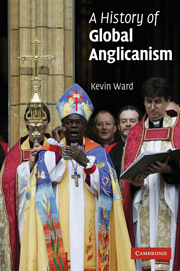Book contents
- Frontmatter
- Contents
- List of maps
- Preface
- List of abbreviations
- 1 Introduction: ‘not English, but Anglican’
- 2 The Atlantic isles and world Anglicanism
- 3 The United States
- 4 Canada
- 5 The Caribbean
- 6 Latin America
- 7 West Africa
- 8 Southern Africa
- 9 East Africa
- 10 The Middle East
- 11 South Asia
- 12 China
- 13 The Asian Pacific
- 14 Oceania
- 15 The Anglican communion: escaping the Anglo-Saxon captivity of the church?
- Maps
- Bibliography
- Index
- Frontmatter
- Contents
- List of maps
- Preface
- List of abbreviations
- 1 Introduction: ‘not English, but Anglican’
- 2 The Atlantic isles and world Anglicanism
- 3 The United States
- 4 Canada
- 5 The Caribbean
- 6 Latin America
- 7 West Africa
- 8 Southern Africa
- 9 East Africa
- 10 The Middle East
- 11 South Asia
- 12 China
- 13 The Asian Pacific
- 14 Oceania
- 15 The Anglican communion: escaping the Anglo-Saxon captivity of the church?
- Maps
- Bibliography
- Index
Summary
THE CHURCH OF THE PLANTERS
The English began their long connection with the Caribbean in the reign of Elizabeth I. England was just beginning to assert itself as a Protestant nation. Its exploits in the Caribbean were an extension of the war with Catholic Spain. Sir Walter Raleigh had grand ideas of converting Indian rulers to the Protestant faith and joining an alliance against the Spanish; but these remained no more than idle fancies. Protestant England had no more concern for the souls of the indigenous populations, the Carib and Arawak, than had the Spanish. Indeed, less so: there was no Anglican theologian of the stature of the Dominican Fra Bartolomé de las Casas to defend the native Americans as fully human, though the Elizabethan clergyman Richard Hakluyt, who publicised English exploits across the globe, made use of las Casas in his attack on Spain's treatment of the American Indians. The English presence in the Caribbean was an extension of the European conflict between Protestants and Catholics, not a conflict about comparative missionary methods. In any case, by the time that the English began actually to occupy Caribbean islands, the native populations were well on the way to extinction.
The first permanent English possessions in the Caribbean came in the 1620s, with the capture of islands in the Lesser Antilles – the Windward and Leeward Islands. St Kitts was taken in 1624, and successful immigration was promoted, involving conflict with the remaining Carib in the area.
- Type
- Chapter
- Information
- A History of Global Anglicanism , pp. 83 - 101Publisher: Cambridge University PressPrint publication year: 2006



